Executive Summary
Atheists and agnostics, Jews and Mormons are among the highest-scoring groups on a new survey of religious knowledge, outperforming evangelical Protestants, mainline Protestants and Catholics on questions about the core teachings, history and leading figures of major world religions.
On average, Americans correctly answer 16 of the 32 religious knowledge questions on the survey by the Pew Research Center’s Forum on Religion & Public Life. Atheists and agnostics average 20.9 correct answers. Jews and Mormons do about as well, averaging 20.5 and 20.3 correct answers, respectively. Protestants as a whole average 16 correct answers; Catholics as a whole, 14.7. Atheists and agnostics, Jews and Mormons perform better than other groups on the survey even after controlling for differing levels of education.
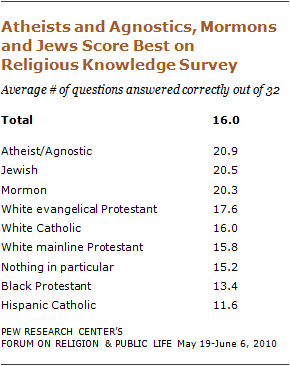
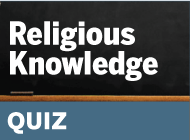
|
How much do you know about religion? And how do you compare with the average American? Take our short, 15-question quiz to find out. |
On questions about Christianity – including a battery of questions about the Bible – Mormons (7.9 out of 12 right on average) and white evangelical Protestants (7.3 correct on average) show the highest levels of knowledge. Jews and atheists/agnostics stand out for their knowledge of other world religions, including Islam, Buddhism, Hinduism and Judaism; out of 11 such questions on the survey, Jews answer 7.9 correctly (nearly three better than the national average) and atheists/agnostics answer 7.5 correctly (2.5 better than the national average). Atheists/agnostics and Jews also do particularly well on questions about the role of religion in public life, including a question about what the U.S. Constitution says about religion.
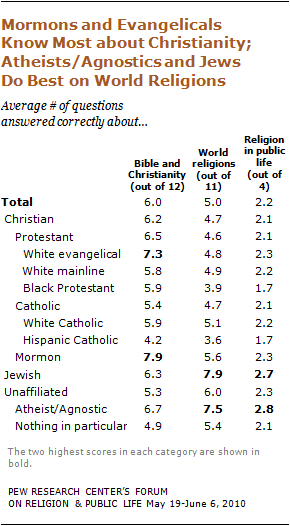
These are among the key findings of the U.S. Religious Knowledge Survey, a nationwide poll conducted from May 19 through June 6, 2010,* among 3,412 Americans age 18 and older, on landlines and cell phones, in English and Spanish. Jews, Mormons and atheists/agnostics were oversampled to allow analysis of these relatively small groups.1
Previous surveys by the Pew Research Center have shown that America is among the most religious of the world’s developed nations. Nearly six-in-ten U.S. adults say that religion is “very important” in their lives, and roughly four-in-ten say they attend worship services at least once a week. But the U.S. Religious Knowledge Survey shows that large numbers of Americans are uninformed about the tenets, practices, history and leading figures of major faith traditions – including their own. Many people also think the constitutional restrictions on religion in public schools are stricter than they really are.
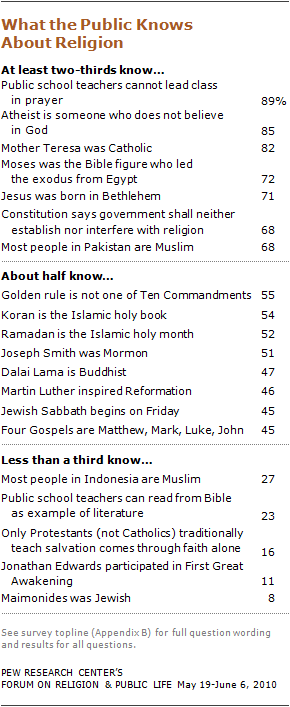
More than four-in-ten Catholics in the United States (45%) do not know that their church teaches that the bread and wine used in Communion do not merely symbolize but actually become the body and blood of Christ. About half of Protestants (53%) cannot correctly identify Martin Luther as the person whose writings and actions inspired the Protestant Reformation, which made their religion a separate branch of Christianity. Roughly four-in-ten Jews (43%) do not recognize that Maimonides, one of the most venerated rabbis in history, was Jewish.
In addition, fewer than half of Americans (47%) know that the Dalai Lama is Buddhist. Fewer than four-in-ten (38%) correctly associate Vishnu and Shiva with Hinduism. And only about a quarter of all Americans (27%) correctly answer that most people in Indonesia – the country with the world’s largest Muslim population – are Muslims.
The survey also finds widespread confusion over the line between teaching and preaching in public schools. Out of a total of 41 knowledge questions (32 about religion and nine testing general knowledge) the single question that respondents most frequently get right is whether U.S. Supreme Court rulings allow teachers to lead public school classes in prayer. Nine-in-ten (89%) correctly say this is not allowed. But among the questions most often answered incorrectly is whether public school teachers are permitted to read from the Bible as an example of literature. Fully two-thirds of people surveyed (67%) also say “no” to this question, even though the Supreme Court has clearly stated that the Bible may be taught for its “literary and historic” qualities, as long as it is part of a secular curriculum.2 On a third question along these lines, just 36% of the public knows that comparative religion classes may be taught in public schools. Together, this block of questions suggests that many Americans think the constitutional restrictions on religion in public schools are tighter than they really are.
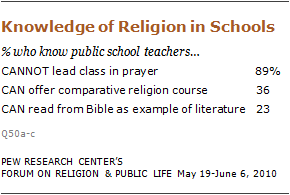
On the other hand, most Americans are able to correctly answer at least half of the survey’s questions about the Bible. For example, roughly seven-in-ten (71%) know that, according to the Bible, Jesus was born in Bethlehem. More than six-in-ten (63%) correctly name Genesis as the first book of the Bible. And more than half know that the Golden Rule – “Do unto others as you would have them do unto you” – is not one of the Ten Commandments. On the full battery of seven questions about the Bible (five Old Testament and two New Testament items) Mormons do best, followed by white evangelical Protestants. Atheists/agnostics, black Protestants and Jews come next, all exhibiting greater knowledge of the Bible than white mainline Protestants and white Catholics, who in turn outscore those who describe their religion as nothing in particular.
Factors in Religious Knowledge
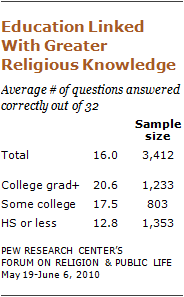
What factors seem to contribute to religious knowledge? Data from the survey indicate that educational attainment – how much schooling an individual has completed – is the single best predictor of religious knowledge. College graduates get nearly eight more questions right on average than do people with a high school education or less. Having taken a religion course in college is also strongly associated with higher religious knowledge.
Other factors linked with religious knowledge include reading Scripture at least once a week and talking about religion with friends and family. People who say they frequently talk about religion with friends and family get an average of roughly two more questions right than those who say they rarely or never discuss religion. People with the highest levels of religious commitment – those who say that they attend worship services at least once a week and that religion is very important in their lives – generally demonstrate higher levels of religious knowledge than those with medium or low religious commitment.3 Having regularly attended religious education classes or participated in a youth group as a child adds more than two questions to the average number answered correctly, compared with those who seldom or never participated in such activities. And those who attended private school score more than two questions better on average than those who attended public school when they were growing up. Interestingly, however, those who attended a private religious school score no better than those who attended a private nonreligious school.
This survey and previous Pew Forum studies have shown that Jews and atheists/agnostics have high levels of educational attainment on average, which partially explains their performance on the religious knowledge survey. However, even after controlling for levels of education and other key demographic traits (race, age, gender and region), significant differences in religious knowledge persist among adherents of various faith traditions. Atheists/agnostics, Jews and Mormons still have the highest levels of religious knowledge, followed by evangelical Protestants, then those whose religion is nothing in particular, mainline Protestants and Catholics. Atheists/agnostics and Jews stand out for high levels of knowledge about world religions other than Christianity, though they also score at or above the national average on questions about the Bible and Christianity. Holding demographic factors constant, evangelical Protestants outperform most groups (with the exceptions of Mormons and atheists/agnostics) on questions about the Bible and Christianity, but evangelicals fare less well compared with other groups on questions about world religions such as Islam, Buddhism, Hinduism and Judaism. Mormons are the highest-scoring group on questions about the Bible.
When education and other demographic traits are held equal, whites score better than minorities on the survey’s religious knowledge questions, men score somewhat better than women, and people outside the South score better than Southerners. The oldest group in the population (age 65 and older) gets fewer questions right than other age groups. However, people 65 and older do about as well as people under age 50 on questions about the Bible and Christianity; they do less well on questions about other world religions.
Other Findings
Other findings of the U.S. Religious Knowledge Survey include:
- On world religions other than Christianity, about six-in-ten Americans (62%) know that most people in India are Hindus. About half know that Ramadan is the Islamic holy month (52%) and can name the Koran as the Muslim holy book (54%). Roughly one-third (36%) correctly associate striving for nirvana with Buddhism.
- Around four-in-ten Americans know that the Mormon religion was founded sometime after 1800 (44%) and that the Book of Mormon tells the story of Jesus appearing to people in the Americas (40%). About half (51%) correctly identify Joseph Smith, founder of the Church of Jesus Christ of Latter-day Saints, as a Mormon.
- In addition to questions about religious knowledge, the survey included nine general knowledge questions (on history, politics, science and literature) for comparison purposes. These show, for example, that about six-in-ten Americans can name the vice president of the United States (59%) and understand that lasers do not work by focusing sound waves (60%). More than seven-in-ten (72%) correctly associate Susan B. Anthony with the movement to give women the right to vote, while just 42% know that Herman Melville was the author of the novel Moby Dick.
- Overall, people who score well on the general knowledge questions also tend to do well on the religion questions. Atheists/agnostics and Jews correctly answer an average of roughly seven of the nine general knowledge questions. Among the public overall, the average respondent correctly answers 5.2 of these general knowledge questions.
- While people with a high level of religious commitment do better than average on the religion questions, people with low levels of religious commitment do better than average on the general knowledge questions.
- Many Americans are devoted readers of Scripture: More than a third (37%) say they read the Bible or other Holy Scriptures at least once a week, not counting worship services. But Americans as a whole are much less inclined to read other books about religion. Nearly half of Americans who are affiliated with a religion (48%) say they “seldom” or “never” read books (other than Scripture) or visit websites about their own religion, and 70% say they seldom or never read books or visit websites about other religions.
- Mormons, black Protestants and white evangelicals are the most frequent readers of materials about religion. Fully half of all Mormons (51%) and roughly three-in-ten white evangelicals (30%) and black Protestants (29%) report that they read books or go online to learn about their own religion at least once a week. Only a small fraction of all religiously affiliated Americans – 6% of the general public and no more than 8% of any religious group – say they read books (other than Scripture) or visit websites to learn about religions other than their own at least once a week.
The remainder of this report is divided into two parts. Section II, “Who Knows What About Religion,” focuses on differences between religious groups in eight domains of knowledge: the Bible, Elements of Christianity, Elements of Judaism, Elements of Mormonism, World Religions, Atheism and Agnosticism, the Role of Religion in Public Life, and Nonreligious Topics. Section III, “Factors Linked With Religious Knowledge,” describes factors associated with religious knowledge. Details about the survey’s methodology are available in Appendix A, and the full wording of all questions and topline survey results are provided in Appendix B.
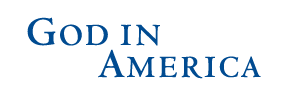
This survey is being released at the God in America National Symposium on Religious Literacy on Sept. 28, 2010, in Washington, D.C. WGBH Television in Boston collaborated with the Pew Forum and the Religious Freedom Education Project at the Newseum on the symposium, which will also feature a screening of the three-part PBS documentary “God in America.” The series interweaves documentary footage, historical dramatization and interviews to explore the historical role of religion in the U.S., including its impact on society, politics and culture.
1 The Pew Forum’s 2007 U.S. Religious Landscape Survey estimated that Jews and Mormons each make up about 1.7% of the U.S. public, while atheists and agnostics combined account for about 4% of the U.S. population. Atheists and agnostics are treated as a single group throughout this report. The survey sample included too few interviews with atheists to analyze them separately. For more details on the sample sizes of religious groups, see Appendix A. (return to text)
[I]
3 This may seem paradoxical, since atheists and agnostics have very low levels of religious commitment and yet score very well on the survey questions. However, atheists and agnostics account for a relatively small share of the total number of people with low levels of religious commitment; 4% of Americans describe themselves as atheists or agnostics, while fully 35% have low religious commitment. Atheists and agnostics answer an average of 20.9 questions correctly, compared with an average of 15.4 correct answers among people with low religious commitment who do not describe themselves as atheists or agnostics. (return to text)
* Correction added April 2011: Interviewing for the survey actually was completed on Friday, June 4, 2010. (return to text)
Photo credit: Eric Swanson/Corbis




